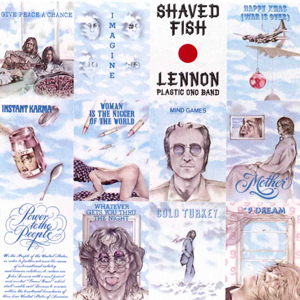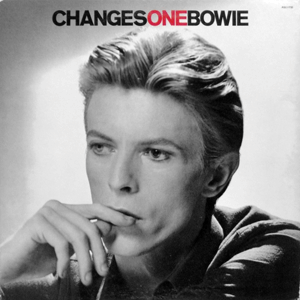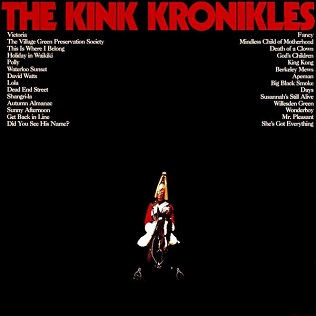See also
| This disambiguation page lists articles associated with the title A-Sides. If an internal link led you here, you may wish to change the link to point directly to the intended article. |
A-Sides is a 1997 compilation album by Soundgarden.
A-Sides may also refer to:
| This disambiguation page lists articles associated with the title A-Sides. If an internal link led you here, you may wish to change the link to point directly to the intended article. |

Endless Summer is a compilation album by American rock band the Beach Boys, released on June 24, 1974. A collection of hits from the band's 1962–65 period, Endless Summer was compiled by their old label, Capitol Records, while the Beach Boys were contracted to Reprise Records. Its unexpected success bore immediate consequences for the band's then-progressive musical direction. It revitalized the band's popularity after years of lukewarm sales, but also inspired nostalgia for the Beach Boys' early surfing and hot rod-themed music, repositioning the group as an oldies act.
A double album is an audio album which spans two units of the primary medium in which it is sold, typically records and compact disc. A double album is usually, though not always, released as such because the recording is longer than the capacity of the medium. Recording artists often think of double albums as being a single piece artistically; however, there are exceptions such as John Lennon's Some Time in New York City and Pink Floyd's Ummagumma and OutKast's Speakerboxxx/The Love Below. Another example of this approach is Works Volume 1 by Emerson Lake and Palmer, where side one featured Keith Emerson, side two Greg Lake, side three Carl Palmer, and side four was by the entire group.
A greatest hits album, sometimes called a "best of" album or catalog album, is a type of compilation album that collects popular and commercially successful songs by a particular artist or band. While greatest hits albums are typically supported by the artist, they can also be created by record companies without express approval from the original artist as a means to generate sales. They are typically regarded as a good starting point for new fans of an artist, but are sometimes criticized by long-time fans as not inclusive enough or necessary at all.

Works is a compilation album of songs by British progressive rock band Pink Floyd, released in 1983. It features a variety of material, including two of the band's early singles, "Arnold Layne" and "See Emily Play," alternative mixes of tracks from The Dark Side of the Moon and the studio outtake "Embryo."

An album is a collection of audio recordings issued as a collection on compact disc (CD), vinyl, audio tape, or another medium. Albums of recorded sound were developed in the early 20th century as individual 78-rpm records collected in a bound book resembling a photograph album; this format evolved after 1948 into single vinyl LP records played at 33 1⁄3 rpm.

Shaved Fish is a compilation album by John Lennon and the Plastic Ono Band, issued in October 1975 on Apple Records. It contains all of the singles that he had issued up to that point in the United States as a solo artist, with the exception of "Stand by Me", which had been released earlier that year. The only compilation of Lennon's non-Beatles recordings released during his lifetime, the album peaked at number 8 in the UK and number 12 in the US. It was also Lennon's final album released on Apple Records.
David Fricke is an American music journalist who serves as the senior editor at Rolling Stone magazine, where he writes predominantly on rock music. One of the best known names in rock journalism, his career has spanned over 40 years. In the 1990s, he was the magazine's music editor before stepping down.

Changesonebowie is a compilation album by English rock musician David Bowie, issued by RCA Records in 1976. It collected songs from the 1969–1976 period, including the first LP appearance of "John, I'm Only Dancing". A "sax version" of this song, cut during the Aladdin Sane sessions in 1973, appeared on the first 1000 copies of the UK pressing. Later pressings of Changesonebowie featured the original version of the single that had been recorded and released in 1972. All U.S. pressings of the LP contain this original version as well.

The Kink Kronikles is a compilation double album by the Kinks, released on Reprise Records in 1972, after the band had signed with RCA Records in 1971. It contains thirteen non-album singles, fourteen tracks taken from five albums released by the band from 1966 to 1971, and one track previously unreleased. Designed specifically for the American market, it peaked at No. 94 on the Billboard 200. The single versions and mixes were not necessarily used for each track.

What a Long Strange Trip It's Been is the second compilation album by the Grateful Dead. It was released August 18, 1977 by Warner Bros. Records, three and a half years after the Skeletons from the Closet compilation. Both albums are subtitled "The Best of the Grateful Dead". Unlike the previous compilation, What a Long Strange Trip It's Been is a double album.

Rare was a David Bowie compilation released by RCA Records in December 1982. The artist's relations with the company were at a low – Bowie had recorded his last music for RCA Records with the Baal EP, and had been annoyed by the release of a five-year-old duet with Bing Crosby as a single without his consultation. Bowie informed RCA he was unhappy with the Rare compilation, and would sign with EMI Records for his next album. All tracks on Rare were being issued for the first time on LP and cassette.
A split album is a music album that includes tracks by two or more separate artists. There have been singles and EPs of the same variety, which are often called "split singles" and "split EPs" respectively. Split albums differ from "various artists" compilation albums in that they generally include several tracks of each artist, or few artists with one or two tracks each, instead of multiple artists with only one or two tracks each.

Hit Factory is a compilation album of songs by the Monkees, released by Pair Records in 1985 and licensed from Arista Records. The album was available as a two-record set or single cassette and sold surprisingly well the year following its release, after the Pleasant Valley Sunday MTV marathon of their television series in February 1986 reawakened interest in the Monkees.

Gold is a compilation album by Steely Dan, released in 1982. It mostly comprises hits both post-dating and not included on their 1978 Greatest Hits, essentially acting as "Volume 2"; it also features additional album tracks, offering a broad perspective on the band's career to that point.

Elvis' Golden Records is a compilation album by American rock and roll singer Elvis Presley, issued by RCA Victor in March 1958. It compiled his hit singles released in 1956 and 1957, and is widely believed to be the first greatest hits album in rock and roll history. It is the first of five RCA Victor Elvis' Golden/Gold Records compilations, the first four of which were issued during Presley's lifetime. The album peaked at number three on the Billboard Top Pop Albums chart and was certified Gold on October 17, 1961, Platinum on May 20, 1988, 5x Platinum on March 27, 1992 and 6x Platinum on August 17, 1999 by the Recording Industry Association of America.

Elvis' Golden Records Volume 3 is a greatest hits album by American rock and roll singer Elvis Presley, released by RCA Victor as LPM/LSP-2765 on August 11, 1963. The album was the third volume of an eventual five volume collection, and his eighteenth altogether. It is a compilation of hit singles released in 1960, 1961, and 1962.

Milestones is a compilation album by The Rolling Stones, released in 1972 by Decca Records. It reached #14 on the UK charts. Less popular and well known than the contemporaneous compilation album Hot Rocks 1964–1971, it was released by Decca without the consent or input from the band. Due to the nature of their contract prior to 1971, the band lost all rights to releases of their own music prior to 1971; those rights instead are held jointly by ABKCO Records and Decca Records. Both ABKCO and Decca would continue to release compilation albums, without input from the band, over the next several decades.

Thank You for the Music is a compilation album by the Swedish pop group ABBA. It was released in November 1983 in the United Kingdom by the record company Epic. The compilation features 14 tracks, including the singles "I Have a Dream", "Chiquitita" and "The Day Before You Came". It also contains the Spanish version of "Fernando", which was the first time this version was released in the UK.
Rarities is the name of two separate and unrelated compilation albums by the English rock band the Beatles. The first was released in the United Kingdom in December 1978, while the second set was issued in the United States in 1980.
A compilation album comprises tracks, which may be previously released or unreleased, usually from several separate recordings by either one or several performers. If by one artist, then generally the tracks were not originally intended for release together as a single work, but may be collected together as a greatest hits album or box set. If from several performers, there may be a theme, topic, time period, or genre which links the tracks, or they may have been intended for release as a single work—such as a tribute album. When the tracks are by the same recording artist, the album may be referred to as a retrospective album or an anthology.